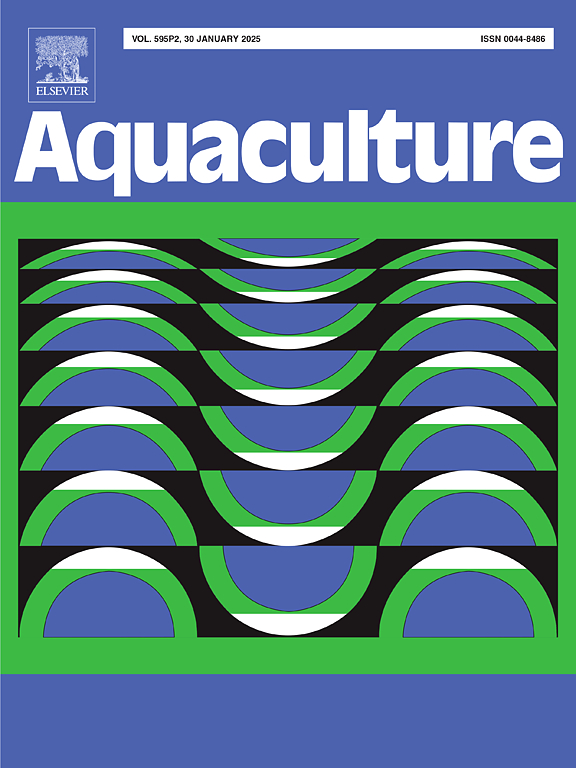Assessment on Chlorella (Chlorella sorokiniana) meal as a substitution for fishmeal in Songpu mirror carp (Cyprinus carpio Songpu) feed: Effect on growth, intestinal health and microflora composition
IF 3.9
1区 农林科学
Q1 FISHERIES
引用次数: 0
Abstract
The experiment aims to investigate Chlorella (Chlorella sorokiniana) replaced fishmeal on growth performance, blood biochemical indices and intestinal health of juvenile Songpu mirror carp (Cyprinus carpio Songpu). Chlorella was substituted for 0 % (G1), 30.0 % (G2), 58.3 % (G3) and 88.3 % (G4) of fishmeal (6 %) in the basal diet. Diets were fed in triplicated groups of Songpu mirror carp with an initial body weight of 5.50 ± 0.03 g/fish for 8 weeks. Results showed that the final body weight and specific growth rate increased significantly in G3, and the feed conversion ratio was significantly lower than in G4. The serum albumin content in G3 was significantly higher than in G4; alanine aminotransferase content was significantly higher than remaining groups except G4. Malondialdehyde content decreased significantly with increasing level of substitution. The intestinal villi of G1 and G3 were in the optimal tissue state, neatly arranged and without shedding. The expression levels of genes associated with intestinal protein synthesis (growth hormone, phosphatidylinositol 3 kinase, protein kinase b, s6 kinase), antioxidant (catalase, glutathione peroxidase 1a) and immune (zonula occluden 1, claudin7, claudin11) were significantly higher in G3 than in G1; the intestinal inflammatory factor Interleukin-1β (IL-1β) was significantly lower than G1. The substitution group decreased the relative abundance of Ascomycetes and Actinobacteria phylum and increased the percentage of Firmicutes. This study indicated that Chlorella was substituted for 58.3 % of fishmeal, it could significantly improve the growth performance, enhance the protein metabolism level and promote the development of intestinal morphology and immunity of Songpu mirror carp.
松浦镜鲤饲料中小球藻(小球藻)粉替代鱼粉的评价:对生长、肠道健康和菌群组成的影响
本试验旨在研究小球藻(Chlorella sorokiniana)替代鱼粉对松浦镜鲤幼鱼生长性能、血液生化指标和肠道健康状况的影响。小球藻替代了基础饲料中0% (G1)、30.0% (G2)、58.3% (G3)和88.3% (G4)的鱼粉(6%)。选取初始体重为5.50±0.03 g/条的松浦镜鲤,分3组饲喂,连续8周。结果表明,G3组的末重和特定生长率显著提高,饲料系数显著低于G4组。G3组血清白蛋白含量显著高于G4组;丙氨酸转氨酶含量显著高于除G4组外的其余各组。丙二醛含量随取代量的增加而显著降低。G1和G3的肠绒毛处于最佳组织状态,排列整齐,无脱落。G3组肠道蛋白合成相关基因(生长激素、磷脂酰肌醇3激酶、蛋白激酶b、s6激酶)、抗氧化相关基因(过氧化氢酶、谷胱甘肽过氧化物酶1a)和免疫相关基因(闭塞带1、claudin7、claudin11)的表达量显著高于G1组;肠道炎症因子白细胞介素-1β (IL-1β)明显低于G1。替代组降低了子囊菌门和放线菌门的相对丰度,提高了厚壁菌门的百分比。本研究表明,小球藻替代了58.3%的鱼粉,可显著改善松浦镜鲤的生长性能,提高蛋白质代谢水平,促进肠道形态和免疫力的发育。
本文章由计算机程序翻译,如有差异,请以英文原文为准。
求助全文
约1分钟内获得全文
求助全文
来源期刊

Aquaculture
农林科学-海洋与淡水生物学
CiteScore
8.60
自引率
17.80%
发文量
1246
审稿时长
56 days
期刊介绍:
Aquaculture is an international journal for the exploration, improvement and management of all freshwater and marine food resources. It publishes novel and innovative research of world-wide interest on farming of aquatic organisms, which includes finfish, mollusks, crustaceans and aquatic plants for human consumption. Research on ornamentals is not a focus of the Journal. Aquaculture only publishes papers with a clear relevance to improving aquaculture practices or a potential application.
 求助内容:
求助内容: 应助结果提醒方式:
应助结果提醒方式:


